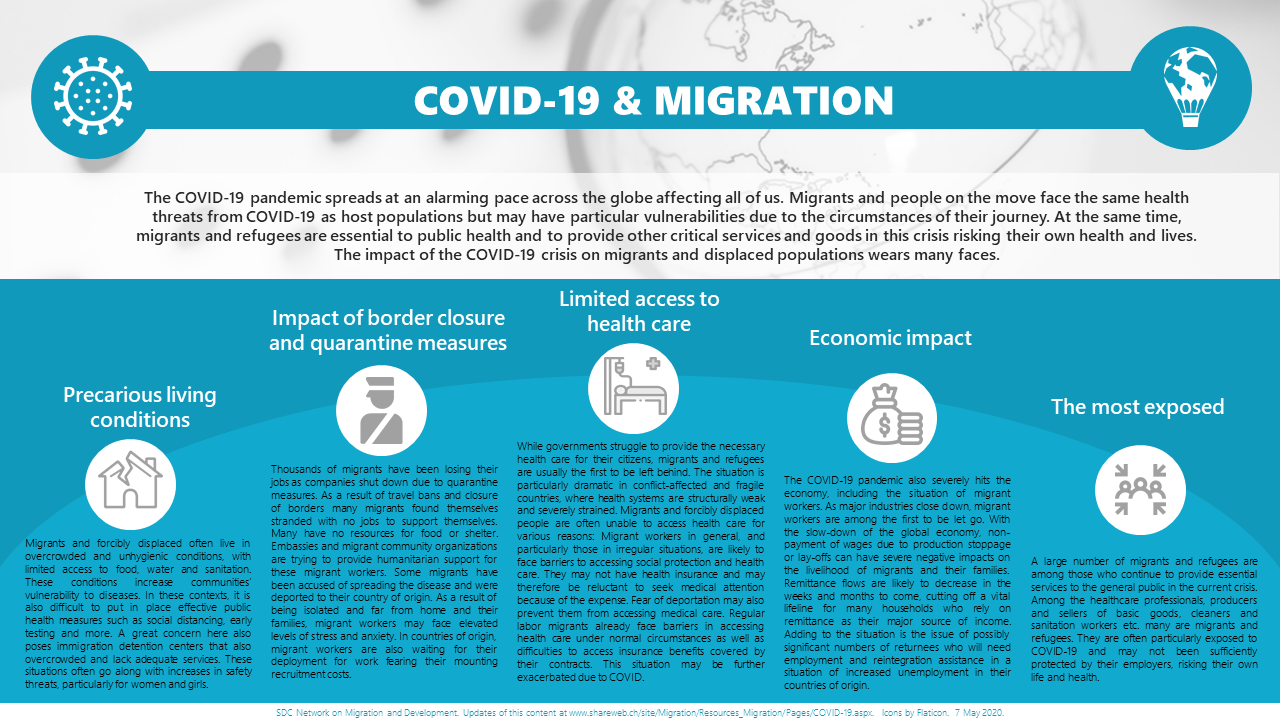
The information on this page is regularly updated based on the evolving COVID-19 situation. The content expressed in the links, do not reflect the views of SDC.
The COVID-19 pandemic spreads at an alarming pace across the globe affecting all of us. Migrants and people on the move face the same health threats from COVID-19 as host populations but may have particular vulnerabilities due to the circumstances of their journey. At the same time, migrants and refugees are essential to public health and to provide other critical services and goods in this crisis risking their own health and lives. The impact of the COVID-19 crisis on migrants and displaced populations wears many faces.
 Impact of border closure and quarantine measures
Impact of border closure and quarantine measures
Thousands of migrants have been losing their jobs as companies shut down due to quarantine measures. As a result of travel bans and closure of borders many migrants found themselves stranded with no jobs to support themselves. Many have no resources for food or shelter. Embassies and migrant community organizations are trying to provide humanitarian support for these migrant workers. Some migrants have been accused of spreading the disease and were deported to their country of origin. As a result of being isolated and far from home and their families, migrant workers may face elevated levels of stress and anxiety. In countries of origin, migrant workers are also waiting for their deployment for work fearing their mounting recruitment costs.
 Limited access to health care
Limited access to health care
While governments struggle to provide the necessary health care for their citizens, migrants and refugees are usually the first to be left behind. The situation is particularly dramatic in conflict-affected and fragile countries, where health systems are structurally weak and severely strained. Migrants and forcibly displaced people are often unable to access health care for various reasons: Migrant workers in general, and particularly those in irregular situations, are likely to face barriers to accessing social protection and health care. They may not have health insurance and may therefore be reluctant to seek medical attention because of the expense. Fear of deportation may also prevent them from accessing medical care. Regular labor migrants already face barriers in accessing health care under normal circumstances as well as difficulties to access insurance benefits covered by their contracts. This situation may be further exacerbated due to COVID.
 Precarious living conditions
Precarious living conditions
Migrants and forcibly displaced often live in overcrowded and unhygienic conditions, with limited access to food, water and sanitation. These conditions increase communities' vulnerability to diseases. In these contexts, it is also difficult to put in place effective public health measures such as social distancing, early testing and more. A great concern here also poses immigration detention centers that also overcrowded and lack adequate services. These situations often go along with increases in safety threats, particularly for women and girls.
 Economic impact
Economic impact
The COVID-19 pandemic also severely hits the economy, including the situation of migrant workers. As major industries close down, migrant workers are among the first to be let go. With the slow-down of the global economy, non-payment of wages due to production stoppage or lay-offs can have severe negative impacts on the livelihood of migrants and their families. Remittance flows are likely to decrease in the weeks and months to come, cutting off a vital lifeline for many households who rely on remittance as their major source of income. Adding to the situation is the issue of possibly significant numbers of returnees who will need employment and reintegration assistance in a situation of increased unemployment in their countries of origin.
 The most exposed
The most exposed
A large number of migrants and refugees are among those who continue to provide essential services to the general public in the current crisis. Among the healthcare professionals, producers and sellers of basic goods, cleaners and sanitation workers etc. many are migrants and refugees. They are often particularly exposed to COVID-19 and may not been sufficiently protected by their employers, risking their own life and health.
See also:
Download infographid [PDF] [PNG]

